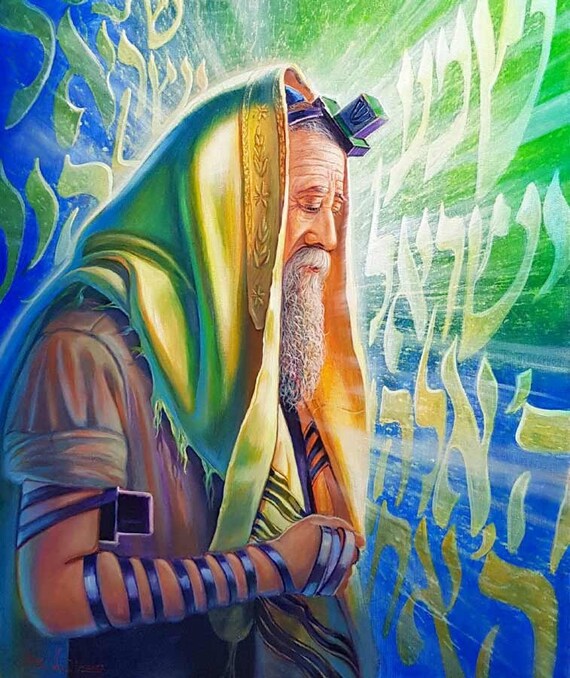
The Significance of the Shema and the Messiah: A Call to Live Out Our Faith
As believers, our faith is rooted in the Torah and the Brit HaDashah that have guided our ancestors for millennia. Among these, the Shema and the concept of the Messiah hold profound importance. They are not just historical or theological concepts; they are calls to action, to live out our faith in meaningful ways. In this post, we’ll explore the significance of the Shema and the Messiah and why it is crucial for us to not only recite the Shema but to embody its teachings in our daily lives.
#### The Shema: A Declaration of Faith and Commitment
The Shema is one of the most central prayers in Judaism, encapsulated in the verses from Deuteronomy 6:4-9:
> “Hear, O Israel: The Lord our God, the Lord is one. Love the Lord your God with all your heart and with all your soul and with all your strength. These commandments that I give you today are to be on your hearts. Impress them on your children. Talk about them when you sit at home and when you walk along the road, when you lie down and when you get up. Tie them as symbols on your hands and bind them on your foreheads. Write them on the doorframes of your houses and on your gates.”
At its core, the Shema is a declaration of the oneness of God and a call to love God with all our being. It is a pledge of allegiance to God, emphasizing total devotion and commitment. Reciting the Shema is an affirmation of faith, but it is also a reminder of the actions that should accompany that faith.
#### Living Out the Shema
The Shema goes beyond a mere verbal affirmation; it calls for a lifestyle that reflects our devotion to God. Here are some practical ways we can live out the Shema:
1. **Heart, Soul, and Strength**: Loving God with all our heart, soul, and strength means dedicating every aspect of our lives to Him. It involves aligning our thoughts, emotions, actions, and resources with God’s will.
2. **Teaching and Transmission**: We are instructed to impress these commandments on our children. This means actively teaching and demonstrating our faith to the next generation, ensuring that our beliefs are passed down and lived out.
3. **Daily Integration**: The Shema encourages us to talk about God’s commandments throughout our daily activities—whether at home or on the road, in the morning or at night. Our faith should permeate every part of our day, influencing our conversations and actions.
4. **Symbols and Reminders**: By tying the commandments as symbols on our hands and binding them on our foreheads, and writing them on our doorframes and gates, we create constant physical reminders of our commitment to God. These practices help keep our faith at the forefront of our minds.
#### The Messiah: Hope and Fulfillment
The concept of the Messiah is another cornerstone of our faith. The Messiah represents the hope for redemption, the fulfillment of God’s promises, and the ultimate restoration of peace and justice. For Christians, Jesus is the Messiah, the one who fulfills the prophecies and brings salvation to the world.
Belief in the Messiah is not just about awaiting a future event; it’s about living in the light of that hope today. The teachings and example of Jesus call us to a life of love, service, and justice. Embracing the Messiah means striving to live as He did—showing compassion, seeking justice, and spreading the good news of God’s kingdom.
#### Reciting and Doing: A Unified Call
The Shema and the Messiah together form a powerful call to action for believers. Reciting the Shema is a way to internalize its message, but doing the Shema—living out its commandments—is where true transformation occurs. Similarly, believing in the Messiah means more than acknowledging His identity; it involves following His teachings and living out His example.
As believers, we are called to a dynamic and active faith. The Shema reminds us of our commitment to God and His commandments, while the Messiah provides the hope and example for how to live out that commitment. Let us strive to not only recite the Shema with our lips but to embody its principles in our lives, and let our belief in the Messiah inspire us to act justly, love mercy, and walk humbly with our God.
In doing so, we fulfill our highest calling and contribute to the realization of God’s kingdom on earth.
The Significance of the Shema and the Messiah: A Call to Live Out Our Faith
As believers, our faith is rooted in the sacred texts and traditions that have guided our ancestors for millennia. Among these, the Shema and the concept of the Messiah hold profound importance. They are not just historical or theological concepts; they are calls to action, to live out our faith in meaningful ways. In this post, we’ll explore the significance of the Shema and the Messiah and why it is crucial for us to not only recite the Shema but to embody its teachings in our daily lives.
#### The Shema: A Declaration of Faith and Commitment
The Shema is one of the most central prayers in Judaism, encapsulated in the verses from Deuteronomy 6:4-9:
> “Hear, O Israel: The Lord our God, the Lord is one. Love the Lord your God with all your heart and with all your soul and with all your strength. These commandments that I give you today are to be on your hearts. Impress them on your children. Talk about them when you sit at home and when you walk along the road, when you lie down and when you get up. Tie them as symbols on your hands and bind them on your foreheads. Write them on the doorframes of your houses and on your gates.”
At its core, the Shema is a declaration of the oneness of God and a call to love God with all our being. It is a pledge of allegiance to God, emphasizing total devotion and commitment. Reciting the Shema is an affirmation of faith, but it is also a reminder of the actions that should accompany that faith.
#### Living Out the Shema
The Shema goes beyond a mere verbal affirmation; it calls for a lifestyle that reflects our devotion to God. Here are some practical ways we can live out the Shema:
1. **Heart, Soul, and Strength**: Loving God with all our heart, soul, and strength means dedicating every aspect of our lives to Him. It involves aligning our thoughts, emotions, actions, and resources with God’s will.
2. **Teaching and Transmission**: We are instructed to impress these commandments on our children. This means actively teaching and demonstrating our faith to the next generation, ensuring that our beliefs are passed down and lived out.
3. **Daily Integration**: The Shema encourages us to talk about God’s commandments throughout our daily activities—whether at home or on the road, in the morning or at night. Our faith should permeate every part of our day, influencing our conversations and actions.
4. **Symbols and Reminders**: By tying the commandments as symbols on our hands and binding them on our foreheads, and writing them on our doorframes and gates, we create constant physical reminders of our commitment to God. These practices help keep our faith at the forefront of our minds.
#### The Messiah: Hope and Fulfillment
The concept of the Messiah is another cornerstone of our faith. The Messiah represents the hope for redemption, the fulfillment of God’s promises, and the ultimate restoration of peace and justice. For Christians, Jesus is the Messiah, the one who fulfills the prophecies and brings salvation to the world.
Belief in the Messiah is not just about awaiting a future event; it’s about living in the light of that hope today. The teachings and example of Jesus call us to a life of love, service, and justice. Embracing the Messiah means striving to live as He did—showing compassion, seeking justice, and spreading the good news of God’s kingdom.
#### Reciting and Doing: A Unified Call
The Shema and the Messiah together form a powerful call to action for believers. Reciting the Shema is a way to internalize its message, but doing the Shema—living out its commandments—is where true transformation occurs. Similarly, believing in the Messiah means more than acknowledging His identity; it involves following His teachings and living out His example.
As believers, we are called to a dynamic and active faith. The Shema reminds us of our commitment to God and His commandments, while the Messiah provides the hope and example for how to live out that commitment. Let us strive to not only recite the Shema with our lips but to embody its principles in our lives, and let our belief in the Messiah inspire us to act justly, love mercy, and walk humbly with our God.
In doing so, we fulfill our highest calling and contribute to the realization of God’s kingdom on earth.
